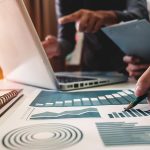Q&A sites and data science forums are buzzing with the same questions over and over again: I'm new to data science, what language should I learn? What's the best language for machine learning? There's an abundance of articles attempting to answer these questions, either based on personal experience or based on job offer data. Τhere's so much more activity in machine … [Read more...] about What is the Best Programming Language for Machine Learning?
Big Data
Learn everything you need to know about big data. Find out how companies are using this revolutionary technology and what it means for your business strategy.
Are You Wasting Your Data or Consuming It?
Last night I was in the checkout line at the grocery store. There was a woman behind me with a cart full of produce who told me, I'll probably end up throwing most of this away. I asked her why. She said she knows she should eat healthy, but it takes too much time and effort to whip up a meal from scratch, and anyway, she wasn't that great of a cook. Despite her best … [Read more...] about Are You Wasting Your Data or Consuming It?
Why Biotech Needs the Power of Data Analytics
The Human Genome Project, that aimed to map and sequence the entire human genome, began in 1990 and ended in 2003 with a starting budget of over $1.5 million. It provided us, for the first time, a means to access invaluable data through genes “ evolution patterns, diseases and their treatments, gene mutations and their effects, anthropological information, etc. Now, powerful … [Read more...] about Why Biotech Needs the Power of Data Analytics
The DNA of a Data Scientist
The role has been coined the sexiest job of the 21st century' by the Harvard Business Review and there is good reason for it. Data Science can be a highly rewarding career path. However, not everyone is cut out for the job. Being a great data scientist takes a certain set of skills. We've compiled a list of all the things that make up the best in the business. A high level of … [Read more...] about The DNA of a Data Scientist
How to Implement a Successful Big Data and Data Science Strategy
Big Data and Data Science are two of the most exciting areas in the business today. While most of the decision makers understand the true potential of both the fields, companies remain skeptical on how to implement a successful big data strategy for their enterprises. This roadmap can help you in defining and implementing the right big data strategy in your organization. There … [Read more...] about How to Implement a Successful Big Data and Data Science Strategy
What is big data?
Big data is a term that refers to the massive amount of digital data created and shared every day. Big data can transform how we live, work, and communicate. It can be used to improve everything from public health and urban planning to business and marketing.
Big data is also changing the way we think about privacy and security. The volume, velocity, and variety of big data present challenges and opportunities for organizations and individuals. Regardless, big data is here to stay, and its impact will only continue to grow in the years to come.
What is big data analytics?
Big data analytics is the process of turning large, complex data sets into actionable insights. Businesses use various analytical tools and techniques, including machine learning and statistical analysis, to do this.
Big data analytics can be used to improve decision-making in areas like marketing, operations, and customer service. It can also be used to identify new business opportunities and optimize existing processes. With the help of big data analysis, businesses can gain a competitive edge by using their data better.
Want to learn more about big data? Datafloq has courses available. Contact us to get started.
When was big data introduced?
The term big data was coined in the 1990s, with some giving credit to John Mashey for popularizing the term. However, the concept of big data has been around for much longer.
Where does big data come from?
In the early days of computing, scientists and businesses began to realize that the amount of data being generated was increasing exponentially. As a result, they began to develop new methods for storing and processing data.
Over time, these methods have become increasingly sophisticated and have played a key role in enabling businesses to make sense of vast amounts of information. Today, big data is used in various industries, from retail to healthcare, and its importance is only likely to grow in the years to come.
What are examples of big data?
One of the most common examples of big data is social media data. With over 2 billion active users, Facebook generates a huge amount of data every day. This includes information on user interactions, posts, and even location data. Analyzing this data can help companies better understand their customers and target their marketing efforts.
Another example of big data is GPS signals. These signals are constantly being generated by devices like cell phones and fitness trackers. When combined with other data sets, GPS signals can be used to provide insights into everything from traffic patterns to human behavior. Finally, weather patterns are another type of big data set. By tracking these patterns over time, scientists can better understand the impact of climate change and develop strategies for mitigating its effects.
How do companies use big data?
Companies use big data in marketing, product development, and customer service. By analyzing large data sets, businesses can identify patterns and trends that would be otherwise difficult to spot. For example, a company might use big data to track customer behavior patterns to improve its marketing efforts.
Alternatively, a company might use big data to improve its products by identifying areas where customers are most likely to experience problems. For instance, big data can be used to improve customer service by finding pain points in the customer journey. Ultimately, big data provides companies with a valuable tool for gaining insights into their business operations.






